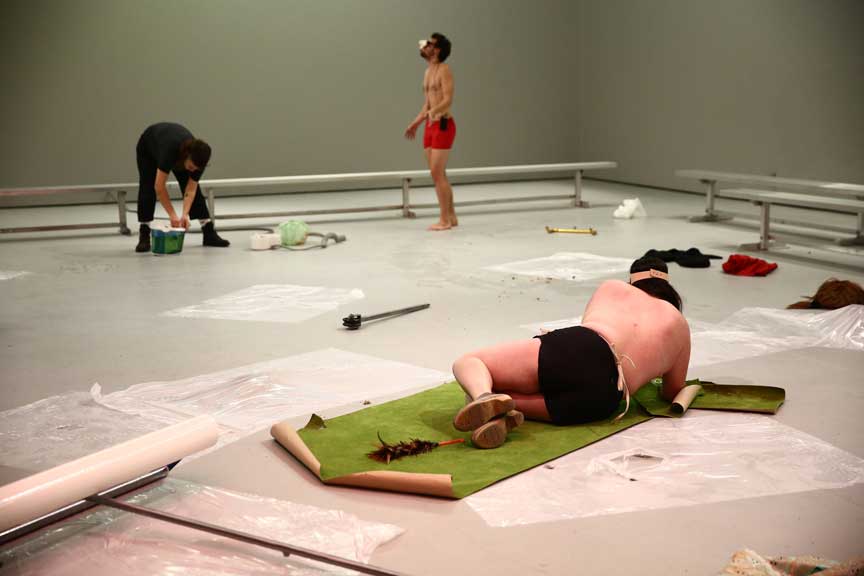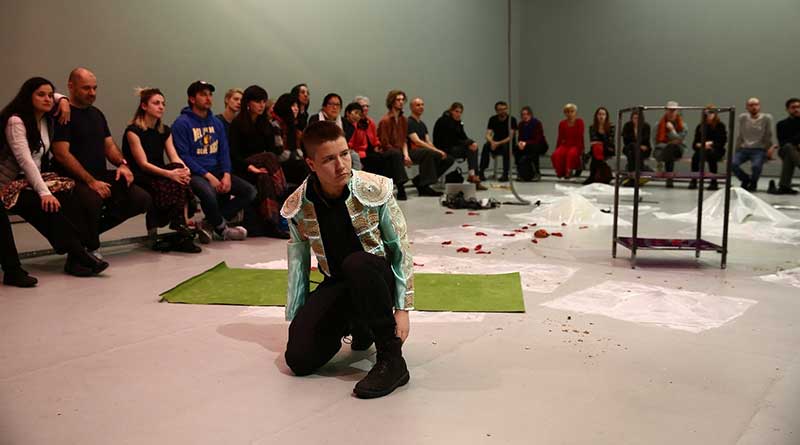Sublime Uncertainty and the Search for a Sweet Spot: Jen Rosenblit’s “Swivel Spot” at the Every Body Festival
By Susie Yugler
May 18th-21st The Sophiensaele in Berlin hosted “The Every Body Festival” focused on dance artists whose work challenges the conventional notion of the dancing body and what it can be. Jen Rosenblit, an American choreographer based in New York and Berlin, was one of the artists invited to present work in the festival. “Swivel Spot” premiered in March 2017 at The Kitchen (NYC) as a companion piece to Rosenblit’s earlier work, “Clap Hands.”
“What if there is no future, what if we swivel on the same spot, mistaking it for change?”
Jen Rosenblit asks in program notes for Swivel Spot. Indeed, the title has one looking for the spot; a shift, a climax, a clue. Yet it would be a mistake to read too far into the gestures or objects played within Swivel Spot, for in the pursuit of defining a moment, we may miss it.
At the start of the work, we enter to find Rosenblit crouching topless over a plastic bag of peanuts, cracking them open one at a time, eyeing the viewers as they select their seats. Scattered about the space; a humidifier in blonde wig, a red jersey, a visor, a clear bottle of mysterious yellow liquid sporting long curly straws, handmade sunglasses, moisturizer, plastic, toys. Enter the “graveyard for parts” as Rosenblit calls it. Geo Wyeth stands at a podium-like cart; macbook open, microphone on, mouth occasionally ajar as if preparing to deliver a speech. Alexia Welch, assistant to the piece, wheels about a massive roll of plastic wrap. At the initial dispensing of the material, the loudness of the action is surprising, thunderous even.
While Welch’s movements remain controlled and subtle, the persistent thunder of the tearing plastic keeps viewers tuned into Welch’s efforts, if only peripherally, as she attempts to quietly hold the space together through the given task. As our senses are heightened sonically, Wyeth’s breath on the microphone grows louder. Together, two lightweight elements, plastic wrap and breath, gain weight and thicken texture; the space becomes heavy. So begins the duet, or trio rather, between Wyeth, Rosenblit, and Welch. Their meetings are more often a brushing of fingertips than a full body collision. They pass one another frequently, they reach without looking or directly seeing, their meetings with the objects and one another are more like coincidences.

The plastic continues to dispense throughout the work, unevenly yet persistently, covering objects found and forgotten. The meaning of an object is never lost but sometimes complicated as the performers treat each with equally unsentimental, yet careful attention. The timing of the work is delightfully intriguing. The performers engage with each object and each other undramatically, for the most part, until something takes shape, or is elicited in a process of discovery. We never see it coming; a tangle of limbs, an explosion into song by Wyeth– each moment resonating with fragility and freshness.
The work is rich and challenging. A duet of intimacy and occurrence, discovery and erasure. Never settling but reaching towards something in the dark, charging forward in a circular motion, going nowhere but unearthing new textures over time. And yet, from my seat I never could stop looking for the spot, or even a swivel. In the search for it, the experience of viewing demanded effort and patience. But pleasure is alive in the experience as well, for example, watching Rosenblit swivel about a golfing green, trimming the faux grass as she goes. Or when she stands promptly to swivel about on her heeled boots, grasping the air above her, before she delivers an arrestingly sober text nearing the end of the work.
Indeed it is the more, almost climactic, or legible sequences in which witnessing the work creeps towards easiness. Nearing the end of the work for example, as an ominous soundscape plays for a third and final time. Wyeth and Rosenblit charge hand-in-hand around the circumference of the space with a comedically literal grim reaper’s scythe in Rosenblit’s other hand. This is an occasion we can try to make sense of, an ending, a death, a conclusion–– almost. It’s the more subtle and disjointed coincidences throughout the duration of the work which demands focus, patience, and effort–– not unlike the relationships and daily tasks in our own lives.
While the unconventionality lies in the queer and trans bodies that perform the work, “Swivel Spot” stands alone outside the context of “Every Body.” It could be said that the placement of the bodies amongst the various objects in the space potentially gives room for viewers to objectify without gendering, but perhaps the veil of “Every Body” as a theme muffles the more pertinent and subtle explorations Rosenblit is unraveling before us. “The maintenance of care” which Rosenblit discusses, is tangible throughout the work. The movements and occurrences in the grand scheme of the piece resemble a sort of life being lived, or two, or three. Sublime uncertainty, awkward timing, a pursuit for something ambiguous but nonetheless meaningful–– Swivel Spot gives so much of which we can make little sense of. The reward is in bearing witness to it.
—
All photos © Paula Court

